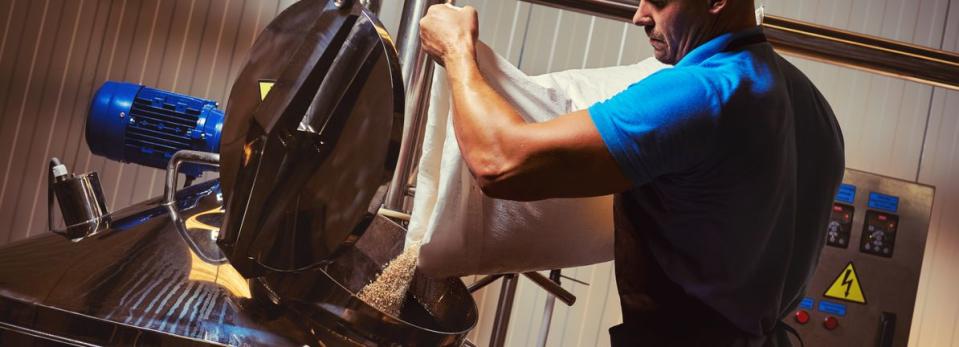How Does Anheuser-Busch InBev's (EBR:ABI) P/E Compare To Its Industry, After The Share Price Drop?

To the annoyance of some shareholders, Anheuser-Busch InBev (EBR:ABI) shares are down a considerable 37% in the last month. Indeed the recent decline has arguably caused some bitterness for shareholders who have held through the 48% drop over twelve months.
Assuming nothing else has changed, a lower share price makes a stock more attractive to potential buyers. While the market sentiment towards a stock is very changeable, in the long run, the share price will tend to move in the same direction as earnings per share. The implication here is that long term investors have an opportunity when expectations of a company are too low. One way to gauge market expectations of a stock is to look at its Price to Earnings Ratio (PE Ratio). A high P/E ratio means that investors have a high expectation about future growth, while a low P/E ratio means they have low expectations about future growth.
View our latest analysis for Anheuser-Busch InBev
How Does Anheuser-Busch InBev's P/E Ratio Compare To Its Peers?
Anheuser-Busch InBev's P/E of 9.74 indicates relatively low sentiment towards the stock. The image below shows that Anheuser-Busch InBev has a lower P/E than the average (16.3) P/E for companies in the beverage industry.
This suggests that market participants think Anheuser-Busch InBev will underperform other companies in its industry. Many investors like to buy stocks when the market is pessimistic about their prospects. If you consider the stock interesting, further research is recommended. For example, I often monitor director buying and selling.
How Growth Rates Impact P/E Ratios
Earnings growth rates have a big influence on P/E ratios. If earnings are growing quickly, then the 'E' in the equation will increase faster than it would otherwise. Therefore, even if you pay a high multiple of earnings now, that multiple will become lower in the future. A lower P/E should indicate the stock is cheap relative to others -- and that may attract buyers.
Anheuser-Busch InBev's earnings made like a rocket, taking off 127% last year. Even better, EPS is up 85% per year over three years. So we'd absolutely expect it to have a relatively high P/E ratio. Regrettably, the longer term performance is poor, with EPS down 4.8% per year over 5 years.
A Limitation: P/E Ratios Ignore Debt and Cash In The Bank
The 'Price' in P/E reflects the market capitalization of the company. So it won't reflect the advantage of cash, or disadvantage of debt. In theory, a company can lower its future P/E ratio by using cash or debt to invest in growth.
Such expenditure might be good or bad, in the long term, but the point here is that the balance sheet is not reflected by this ratio.
Is Debt Impacting Anheuser-Busch InBev's P/E?
Net debt totals a substantial 111% of Anheuser-Busch InBev's market cap. This level of debt justifies a relatively low P/E, so remain cognizant of the debt, if you're comparing it to other stocks.
The Verdict On Anheuser-Busch InBev's P/E Ratio
Anheuser-Busch InBev trades on a P/E ratio of 9.7, which is below the BE market average of 12.9. The company may have significant debt, but EPS growth was good last year. If the company can continue to grow earnings, then the current P/E may be unjustifiably low. What can be absolutely certain is that the market has become more pessimistic about Anheuser-Busch InBev over the last month, with the P/E ratio falling from 15.6 back then to 9.7 today. For those who prefer to invest with the flow of momentum, that might be a bad sign, but for deep value investors this stock might justify some research.
Investors should be looking to buy stocks that the market is wrong about. As value investor Benjamin Graham famously said, 'In the short run, the market is a voting machine but in the long run, it is a weighing machine. So this free visualization of the analyst consensus on future earnings could help you make the right decision about whether to buy, sell, or hold.
But note: Anheuser-Busch InBev may not be the best stock to buy. So take a peek at this free list of interesting companies with strong recent earnings growth (and a P/E ratio below 20).
If you spot an error that warrants correction, please contact the editor at editorial-team@simplywallst.com. This article by Simply Wall St is general in nature. It does not constitute a recommendation to buy or sell any stock, and does not take account of your objectives, or your financial situation. Simply Wall St has no position in the stocks mentioned.
We aim to bring you long-term focused research analysis driven by fundamental data. Note that our analysis may not factor in the latest price-sensitive company announcements or qualitative material. Thank you for reading.

 Yahoo Finance
Yahoo Finance 
